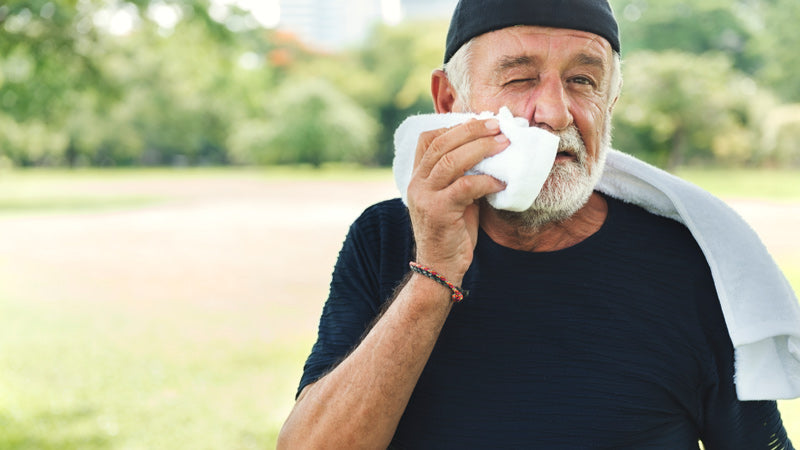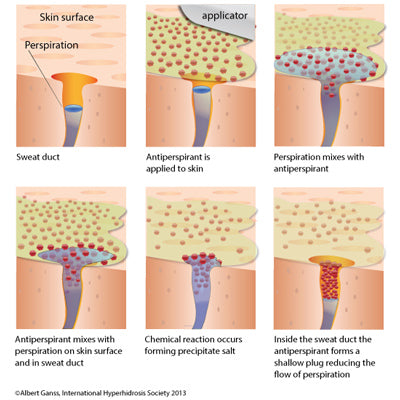Diaphoresis is a medical term used to describe excessive sweating.
Swearing in this manner isn't attributed to being active or to your environment.
Diaphoresis tends to affect the body as a whole rather than in certain parts alone.
It is also referred to as secondary hyperhidrosis.
While they may seem similar, there's a distinction between diaphoresis and hyperhidrosis.
What's the Difference Between Diaphoresis and Hyperhidrosis?
Hyperhidrosis (commonly referred to as primary hyperhidrosis) is also associated with profuse sweating.
However, hyperhidrosis is believed to be a nervous system disorder.
Someone affected by primary hyperhidrosis experiences sweating on select parts of the body, such as the underarms or palms.
By contrast, diaphoresis is normally a symptom of an underlying health condition.
Some of these conditions may be life-threatening. As such, they call for immediate medical attention.
Diaphoresis may also be a side effect brought about by certain medications.
Read on for more on this as well as ways to make sweating more bearable such as wearing sweat-proof clothing.
Why Is It Good to Sweat?
While it's very easy to think of sweat as unpleasant, we can't deny its importance.
Sweat serves as a cooling mechanism for your body.
The instant your body temperature starts to rise your nervous system signals for your sweat glands to release sweat.
This cools the surface of your skin and reduces the body's core temperature.
We all know it's normal to sweat more intensely on a hot day, or after intense physical activity.
And, some people just begin to sweat much sooner than others. Often, they tend to sweat more too. This is attributed to genetic factors.
What's abnormal is experiencing heavy sweating repeatedly when there's no clear reason.
So, then, what causes such sweating patterns? Let's examine this in the section below.
What Causes Diaphoresis?
Diaphoresis is associated with a broad range of conditions, ranging from anxiety to diabetes and even certain cancers.
It's therefore important to consult your doctor to single out the cause from among the following:
Diabetes
If you have diabetes, your sweating could be attributed to low blood sugar (hypoglycemia).
Hypoglycemia is accompanied by:
- Anxiety
- Blurred vision
- Slurred speech
- Shaking
- Dizziness
It's crucial to restore your blood sugar levels fast, as hypoglycemia can be life-threatening if not addressed in good time.
Pregnancy
During pregnancy, the hormone levels tend to go up. You begin to experience faster metabolism and body temperature goes up as a result.
Furthermore, pregnancy causes weight gain. This also increases your body temperature as well as the amount of sweat your body produces.
More intense sweating is normal during pregnancy unless it is accompanied by fever, vomiting or body aches.
Menopause
Many women experience sweating and hot flashes during menopause and perimenopause.
Intense sweating occurs mostly at night.
Studies have established this to be the case for up to 85 percent of women.
Perimenopause is the period between which menstruation stops but before menopause starts.
Diaphoresis attributed to menopause is a result of hormone activity.
Hormones such as estrogen trigger excess perspiration by sending false signals to the brain. They communicate that your body is overheated while it isn't.
Menopausal hormone therapy administered in low doses for a short period can offer relief.
Medication
If you're on medication, this may explain profuse sweating.
Some prescription and over-the-counter medications are common triggers of diaphoresis as a side effect including:
- Pain medications
- Hormonal medications
- Antibiotics and antiviral drugs
- Drugs used in chemotherapy
- Antidepressants
Hyperthyroidism
The thyroid gland is part of the endocrine system, which affects several body processes such as metabolism.
Several conditions can affect the thyroid gland. One of these is hyperthyroidism.
Hyperthyroidism is a condition in which your thyroid gland produces too much thyroxine.
Thyroxine is a hormone that plays a vital role in heart and digestive function, brain development as well as muscle control.
Hyperthyroidism speeds up your metabolism. You may then experience the following in addition to heavy sweating:
- Sleeping difficulties
- Feeling nervous and anxious
- Faster heartbeat
- Shaking (for instance on your hands)
- Weight loss
Hyperthyroidism is not a medical emergency, but it does require medical treatment nevertheless.
Withdrawal Effects
Withdrawal is a condition characterized by symptoms that occur when someone stops using drugs and substances.
Often, one experiences excessive sweating all over the body. The sweating may occur as night sweats.
Other symptoms of withdrawal include:
- Disorientation
- Lethargy
- Slurred speech
- Severe anxiety
- Irritability
Withdrawal can be life-threatening.
If you or someone you know is going through this, it's best to work with professionals trained in managing addiction rather than handling it alone.
When Should You See Your Doctor?
While sweating heavily on occasion may not necessarily be cause for concern, certain circumstances that call for medical intervention.
First, diaphoresis can affect normal life. It can lead to embarrassment, anxiety and affect how we socialize. If this is the case, it's important to see your doctor.
Should you begin to sweat heavily on one side of your body, it's advisable to seek medical attention immediately.
This could be an indication of asymmetric hyperhidrosis, which may be caused by a neurological issue.
Another reason to see your doctor is sweating that causes a rash or irritation on your skin.
You should also see your doctor if the perspiration causes any skin irritation or rash lasting longer than a few days.
This could mean you have a bacterial or fungal skin infection.
Seek immediate medical attention if sweating is accompanied by the following symptoms:
- Cold and clammy skin
- Dizziness
- Loss of consciousness
- Nausea
- Vomiting
- Pale skin
- Chest pain
- Heart palpitations
- Breathing difficulties
- Seizures
How Is Diaphoresis Treated?
There are several ways to treat diaphoresis depending on the cause.
Clinical-strength antiperspirants can help with excessive sweating particularly in the underarms.
These antiperspirants contain an active ingredient such as aluminum chloride which works by plugging the sweat ducts.
The body reacts to clogged sweat ducts by reducing sweat production.
Onabotulinumtoxina (Botox) injections can relieve diaphoresis in the short-term. These injections are administered on affected areas such as the palms and underarms.
Another possible treatment is iontophoresis, a procedure that uses a small electrical current to temporarily reduce sweating on the hands and feet.
In some cases, your doctor may prescribe oral anticholinergic medication.
Examples are oxybutynin or glycopyrrolate.
How To Manage Excessive Sweating
Though diaphoresis can be uncomfortable and often seem unbearable, there are some measures you can take to reduce the amount of sweat your body produces.
Wear clothes made of breathable fabric such as cotton or linen.
Layer your outfits, so you can remove clothing when the need arises (e.g., when it gets hotter during the day).
Avoid foods and drinks that trigger heavy sweating. These include spicy food, caffeine, and alcohol.
Stay hydrated by drinking plenty of cool water.
Want to Stay Dry and Fresh Around the Clock? Try Sweatshield Undershirts
One of the best ways to deal with excessive sweating is wearing sweat-proof clothing.
Regular clothes can trap sweat. This may result in odor, as well as yellowing around areas where you sweat.
Sweatshield's undershirts are made of micromodal fabric. Not only is it comfortable to wear, but it's also a breathable fabric.
Sweatshield undershirts allow sweat and heat to escape from areas prone to heavy sweating such as the back and underarms.
This is achieved through sweat barrier technology.
This ensures that you stay fresh, dry and confident to live your life unhindered by sweat, discomfort, and odor.
Sweatshield has helped many for over a decade, and here's what a few have to say:

Click here to read more testimonials
You can read more positive feedback from our clients all over the world here.
Naturally, you most likely have questions about Sweatshield that you'd like answered in order to make an informed decision.
Here are responses to some frequently asked questions about Sweatshield undershirts:
Sweatshield FAQs
Do Sweatshield Undershirts Work?
Absolutely! The underarm sweat shield technology underwent several years of development prior to its roll out.
This means that our sweat proof shirts truly work. Our testimonials attest to it!
Are Sweatshield Undershirts Moisture-Wicking?
Absolutely not. Sweatshield Undershirts are designed to absorb moisture, not wick moisture.
Wicking is the process of transferring moisture from the inner garment to the outer garment.
We don't want this to happen, as it can cause odor or have your clothing soaked.
What's Your Return and Exchange Policy?
You can return any item to us within 30 days for a 100% refund.
To find out more, head over to our Returns, Refunds, and Exchanges page.
Say goodbye to your sweat-related stress. Get your undershirt from our men's or women's range in a style, color, and size that suits your taste.
Photo: Rawpixel










